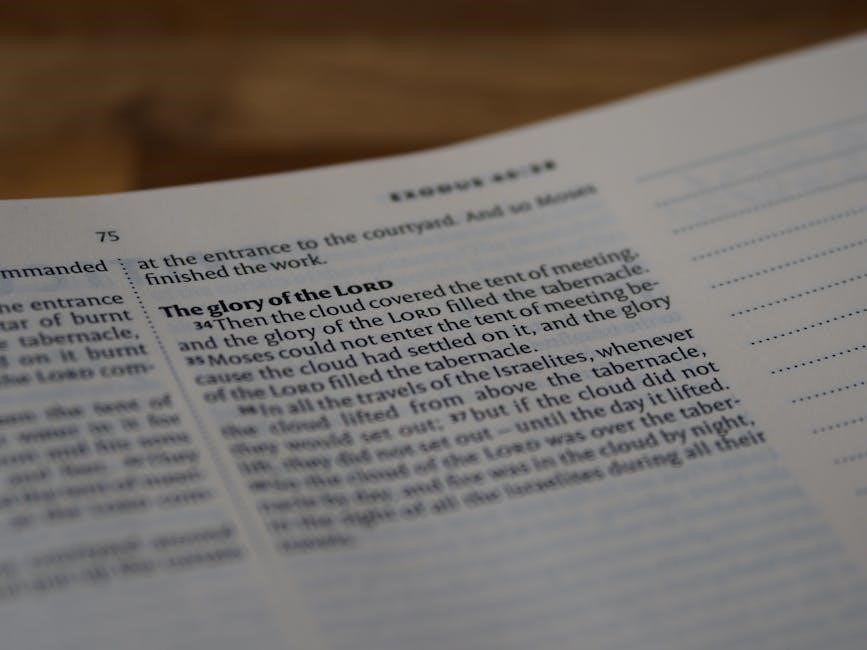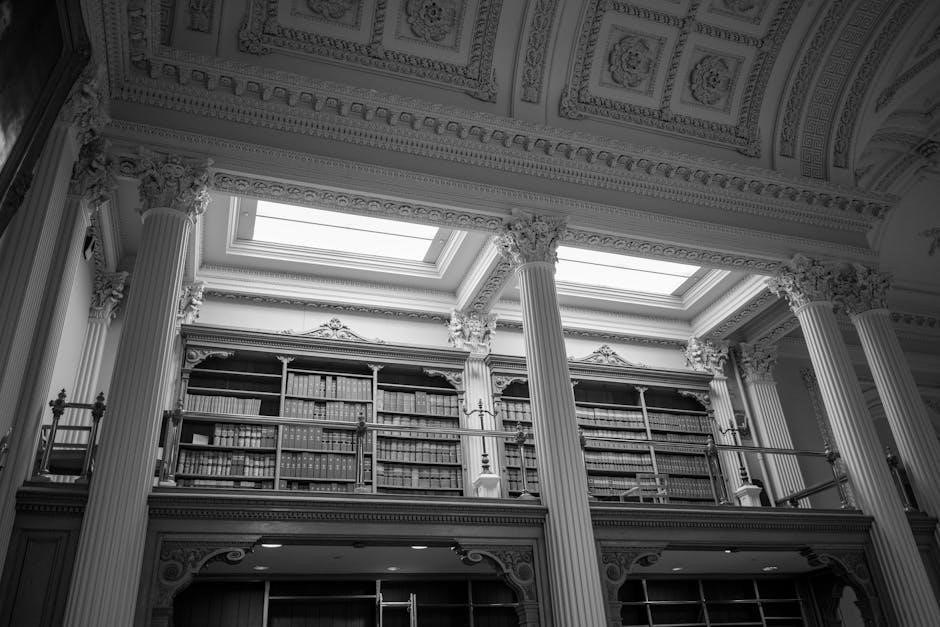William Golding’s Lord of the Flies is a gripping 1954 novel about British boys stranded on an island, exploring human nature, society, and civilization’s collapse.
Overview of the Novel
Lord of the Flies, William Golding’s 1954 debut novel, tells the story of British boys stranded on a remote island after a plane crash. With no adult supervision, the group attempts to govern themselves, leading to a descent into chaos and savagery. The novel explores themes of human nature, fear, power, and the clash between civilization and primal instincts. Through vivid characters like Ralph, Jack, and Piggy, Golding examines how societal norms crumble when humanity is tested. This timeless allegory remains a powerful commentary on human behavior and morality, resonating with readers worldwide. Its availability in PDF format has made it accessible to a broader audience, ensuring its enduring relevance in modern literature.
Historical Context and Publication
Lord of the Flies, written by William Golding, was first published in 1954; The novel emerged during a post-World War II era, reflecting societal anxieties about human nature. Initially controversial, it gained acclaim for its bold exploration of civilization’s collapse. The book’s manuscripts and correspondence with its editor are now celebrated, showcasing its journey to publication. To mark its 70th anniversary, special editions and adaptations, including a TV series, have been released. Its enduring popularity has made it a staple in literature, with PDF versions widely available for modern readers.
William Golding, a Nobel Prize-winning British author, is best known for Lord of the Flies, his 1954 debut novel that explores human nature and societal collapse.
Biography and Literary Career
William Golding was born on September 19, 1911, in Cornwall, England. He developed a passion for writing early in life, influenced by his scientist father and musician mother. Before becoming a full-time writer, Golding worked as a schoolteacher and later served in the Royal Navy during World War II. His experiences during the war profoundly shaped his worldview and writing style. Lord of the Flies, his debut novel, brought him critical acclaim and established his reputation as a major literary figure. Over his career, Golding authored numerous novels, essays, and plays, exploring themes of human nature, morality, and society. His work earned him the Nobel Prize in Literature in 1983, solidifying his legacy as one of the 20th century’s most influential writers.
Golding’s Writing Style and Philosophy
William Golding’s writing style is characterized by its depth, symbolism, and exploration of moral themes. His works often delve into the complexities of human nature, challenging societal norms and expectations. Golding’s philosophy revolves around the idea that humanity is inherently flawed, a theme central to Lord of the Flies. His narrative techniques, such as using isolated settings and vivid imagery, create a sense of realism and tension. Golding’s unique approach earned him the Nobel Prize in Literature in 1983, recognizing his ability to explore the human condition through compelling storytelling and profound philosophical insights.

Plot Summary
William Golding’s Lord of the Flies recounts a plane crash of British boys on an island, exploring their descent from cooperation to primal conflict and inherent evil.
Setting and Initial Conflict
The story unfolds on a remote, uninhabited island after a plane crash strands a group of British schoolboys. With no adult supervision, the boys must navigate their new environment. The island’s lush landscapes and abundant wildlife initially fascinate them, but challenges arise as they attempt to establish order. The novel’s opening scenes depict the boys discovering the island, gathering resources, and holding their first assembly. Tensions surface as Ralph and Jack disagree over priorities—building shelters versus hunting. This clash marks the beginning of a power struggle that escalates throughout the narrative.
Key Events and Turning Points
The boys’ attempt to maintain civilization falters when fear of a “beast” spreads. Ralph calls an assembly, but Jack’s obsession with hunting dominates, leading to a pivotal conflict. Later, Simon discovers the truth about the “beast”—a dead pilot—but dies before revealing it. The conch shell, a symbol of democracy, is destroyed, marking a turning point. Jack forms his own tribe, and Ralph is hunted, forcing him to flee. These events highlight the descent into chaos and savagery, underscoring Golding’s exploration of humanity’s darker nature.

Themes in “Lord of the Flies”
Exploring human nature, society, and the clash between civilization and savagery, the novel delves into fear, power, and inherent darkness within individuals.
Human Nature and Society
In Lord of the Flies, Golding examines how isolation reveals the true aspects of human behavior, challenging the notion of inherent civility. The boys’ descent into chaos highlights the fragility of societal norms when authority is absent. Through their actions, the novel portrays the tension between individual desire and collective order, raising questions about whether humanity is inherently good or prone to savagery. This thematic core remains central to the book’s enduring relevance and philosophical depth.
Fear, Power, and Civilization vs. Savagery
In Lord of the Flies, fear and power struggles drive the boys’ transformation from civilized individuals to savage beings. The novel explores how fear of the unknown, symbolized by the “beast,” erodes rationality and fosters tribal behavior. Ralph’s democratic ideals clash with Jack’s authoritarianism, illustrating the conflict between order and domination. As the boys abandon moral constraints, the line between civilization and savagery blurs, revealing the darker aspects of human nature. Golding’s portrayal underscores how fear and the lust for power can dismantle even the most fragile social structures, leading to chaos and violence.

Characters
Ralph, Jack, and Piggy are central figures, each representing different aspects of human nature. Ralph embodies leadership and order, while Jack symbolizes power and savagery. Piggy’s intellect and morality contrast their primal descent, highlighting the internal and external conflicts within the group.
Major Characters: Ralph, Jack, Piggy
Ralph, the fair-haired leader, represents order and democracy, striving to maintain civilization. Jack, with his obsession for hunting, embodies primal instincts and the lust for power. Piggy, the intelligent and rational one, symbolizes wisdom and morality, often serving as the voice of reason. Together, they form a dynamic trio that drives the novel’s exploration of human nature, societal breakdown, and the clash between civilization and savagery. Their interactions and conflicts shape the story’s tense and thought-provoking narrative.
Symbolism and Character Development
The novel is rich in symbolism, with the island representing a microcosm of society. The conch shell symbolizes order and democracy, while the beast embodies fear and paranoia. Ralph’s leadership and Jack’s descent into savagery illustrate the conflict between civilization and primal instincts. Piggy’s glasses represent clarity and reason, which are gradually lost. Through their development, Golding explores how isolation and fear erode moral values, transforming innocent boys into primal beings. These symbols enhance the novel’s themes of human nature and societal collapse.
Availability of “Lord of the Flies” in PDF Format
Legal and free PDF versions of Lord of the Flies can be found on platforms like Google Books or through official publishers, ensuring easy access for readers.
Where to Find Legal and Free PDF Versions
Legal and free PDF versions of Lord of the Flies can be accessed through reputable platforms like Project Gutenberg, ManyBooks, or Google Books. Some editions are available for free due to public domain laws, while others may require purchase. Libraries often offer e-book rentals through services like OverDrive. Additionally, educational institutions may provide access to digital copies for students. Always ensure to download from authorized sources to avoid copyright infringement. For the latest 70th-anniversary editions, consider checking official publishers or digital bookstores like Amazon Kindle.
Popular Editions and Downloads
Lord of the Flies is widely available in various digital formats, including PDF. The Folio Society edition, illustrated by Sam Weber, is a popular choice among readers. Many downloads are accessible via platforms like Amazon Kindle and Google Books. The novel has been released in multiple anniversary editions, celebrating its 70th anniversary. These editions often include introductions by notable authors like Ian McEwan. Digital versions are also available through major ebook retailers, offering convenience for modern readers. The book’s enduring popularity ensures its presence in diverse formats for global audiences.

Impact and Legacy
Lord of the Flies has profoundly influenced literature and culture. Its exploration of human nature has led to numerous adaptations, including a forthcoming TV series. Anniversary editions celebrate its enduring relevance.
Cultural Significance and Adaptations
Lord of the Flies holds significant cultural importance, with its themes resonating globally. A new TV series adaptation by Jack Thorne is forthcoming, marking its first television adaptation. Celebrating its 70th anniversary, rare manuscripts and editions are being showcased, highlighting its lasting influence. The novel’s exploration of human nature continues to inspire adaptations, solidifying its place in literature. Its availability in PDF format ensures accessibility for modern readers, further cementing its relevance in contemporary culture.
Modern Relevance and Anniversary Editions
Lord of the Flies remains strikingly relevant today, with its exploration of human nature and societal collapse. To celebrate its 70th anniversary, special editions are being released, including a Folio Society version introduced by Ian McEwan and illustrated by Sam Weber. These editions highlight the novel’s enduring themes, appealing to both longtime fans and new readers. The book’s modern relevance is further underscored by its upcoming TV adaptation, ensuring its influence continues to grow. Anniversary editions offer fresh perspectives, keeping Golding’s timeless story alive for future generations.